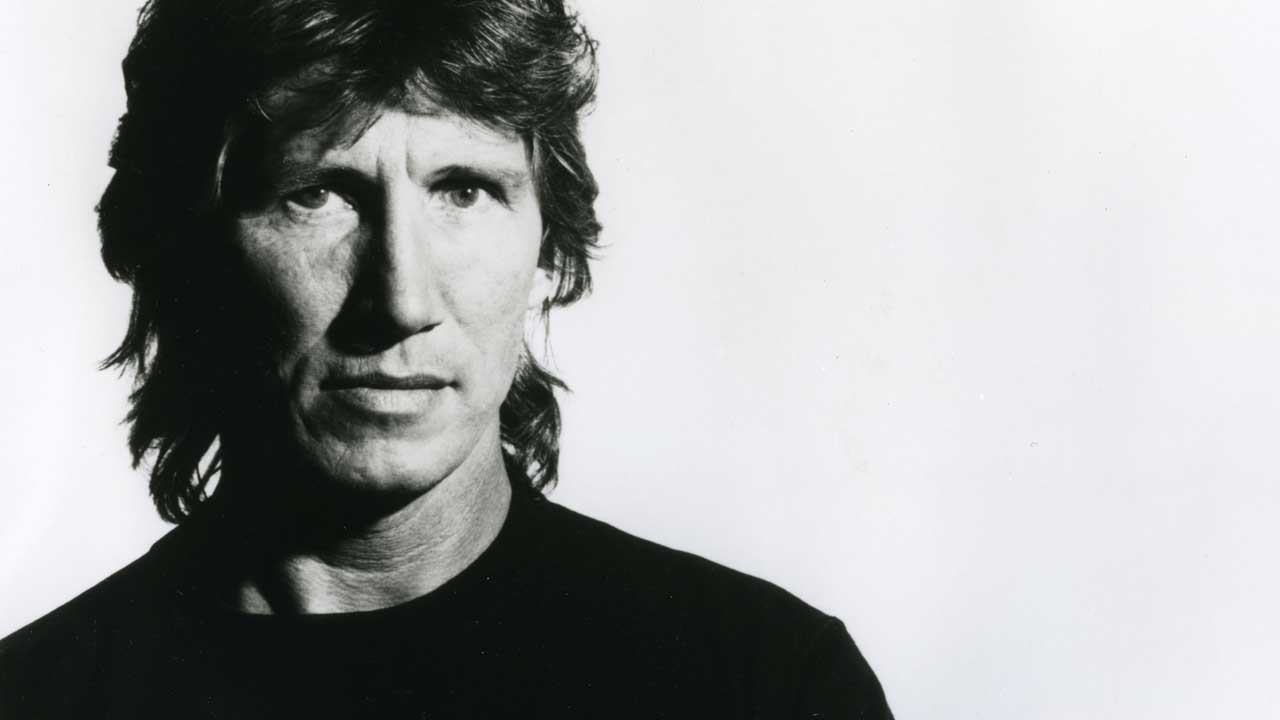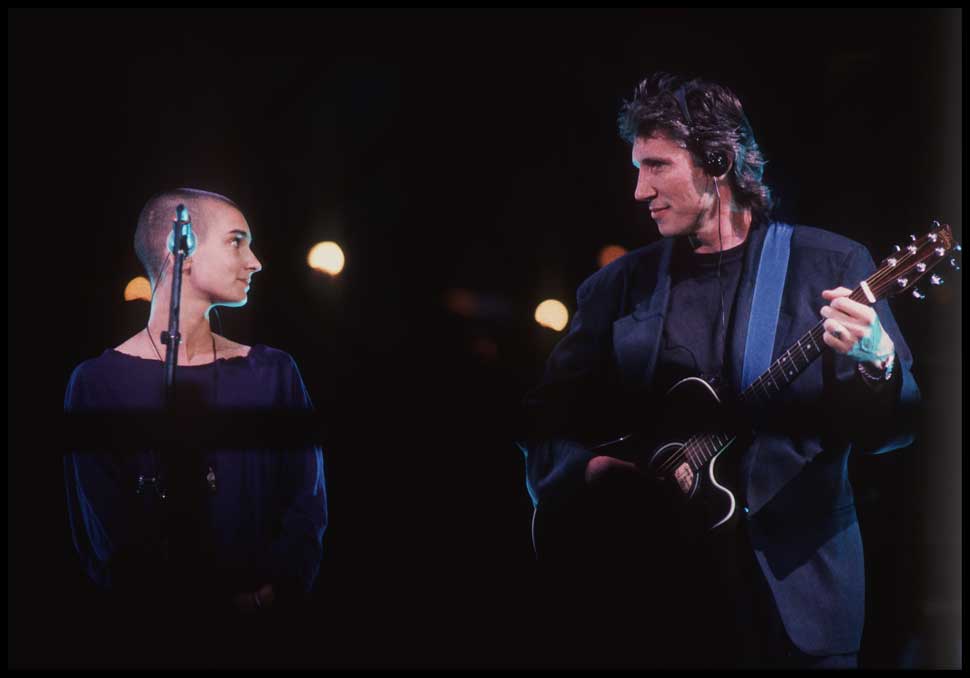
In the end it was Sinéad O’Connor who drove Roger Waters to distraction. It was the summer of 1990, and the former Pink Floyd vocalist and bassist was putting together a one-off live staging of his magnum opus The Wall to mark the fall of the real Berlin Wall. The album’s themes of alienation, isolation and the futility of war couldn’t have been more timely. To stage it in front of 350,000 people near Berlin’s Brandenburg Gate at such a pivotal moment in history was nothing short of momentous.
But there was another reason it was important. Waters’ commercial stock had fallen dramatically since he left Pink Floyd five years earlier. His two solo albums, 1984’s The Pros And Cons Of Hitch Hiking and 1987’s Radio K.A.O.S., had failed to match the success of his old group. To make things worse, his former bandmates had won a bitter legal battle to resurrect the Pink Floyd name without him, to his eternal ire. This new restaging of The Wall was a chance for Roger Waters to remind people who he was.
The show required months of military-precision planning. On the night, the cast of musicians that Waters had enlisted to breathe life into the crazed characters that populated the album – the Scorpions, Bryan Adams, Joni Mitchell, Cyndi Lauper, Tim Curry – did what was expected of them. Well, all except one.
“Everyone was fabulous to work with,” Waters recalled in 1992. “All brilliant. Except for Sinéad O’Connor. Oh, God. I have never ever met anybody who is so self-involved and unprofessional and big-headed and unpleasant. She is so far up her own bum it’s scary.”
According to Waters, the famously truculent Irish singer was worried the show wasn’t ‘street’ enough. He claimed she had suggested he should employ Ice-T to give one of the songs a hip-hop makeover.
“She’s just a silly little girl,” he said afterwards. “You can’t just shave your head and stick it up your arse and occasionally pull it out to go: ‘Oh, I think this is wrong and that is wrong’ and burst into tears.”
In the end, Waters won out. The show went ahead, with O’Connor grudgingly singing the stark ballad Mother.
Culturally, the event was a triumph. But it was an even bigger personal victory for the man who wrote it. It re-established Waters as a major force, banishing the memories of a turbulent few years and opening the door for one of his greatest artistic victories.
Two years after his Berlin show, Waters released his third solo album, Amused To Death. That record placed him back on the pedestal he’d tumbled from a few years earlier. Its vast musical sweep and complex themes were, as he saw it, a reclamation of the legacy that had been stolen from him by his former Pink Floyd colleagues. Or, as an uncharacteristically pithy Waters put it at the time: “Amused To Death is fucking, fucking good, isn’t it?”

The late 80s hadn’t been a great time for Waters. His second solo album, Radio K.A.O.S., was released to a disinterested shrug from the public, and barely scraped into the US Top 50. To make matters worse, the David Gilmour-led Floyd’s new album, A Momentary Lapse Of Reason, released a few months later, hit the top three on a both sides of the Atlantic.
“We were on the road in America with Radio K.A.O.S, and the Floyd were out at the same time,’” says Andy Fairweather Low, who played guitar in Waters’ solo band. "We would be in our hotel in Wisconsin or wherever it was, and someone would get the review of the Floyd show and shove it under the door for us to read. And you’d go: ‘Ah, I see what’s happening here.’”
Fairweather Low first met Waters in 1967, when the band he was the singer with, Amen Corner, were part of a package tour that also featured The Pink Floyd and Jimi Hendrix. Fairweather Low joined Waters’ band for the tour of The Pros And Cons Of Hitch Hiking on the recommendation of mutual friend Eric Clapton, and remained there, on and off, for more than 20 years.
“Roger is a very funny man, but he’s very to-the-point and doesn’t suffer fools,” he says. “But if he’s prickly, there’s a bloody good reason for it. It’s like an army, and he’s in charge. If anyone loses that level of respect for what’s going on, it’s not going to work.”
Waters needed to marshal all his skills as a general on the Radio K.A.O.S. tour. While Floyd were pulling in the crowds, Waters was struggling to fill venues he would have sold out many times over with his old band.
“I remember we played the Reunion Hall in Dallas, and there must have been a couple of thousand people in there,” says Fairweather Low. “And that’s an eighteen-thousand-seater. I’d say to people: ‘I’m out with Roger Waters.’ And they’d go: ‘Roger Waters?’ ‘Pink Floyd.’ ‘What, the guitar player?’ ‘No, the bass player – the guy who wrote a lot of the songs.’”
With Radio K.A.O.S. seemingly a lame duck, Waters was already plotting his next move. In October 1987, during a break in the tour, he and his band travelled to the Bahamas to begin working on new music. “I was absolutely certain I would make it in absolutely bone-simple traditional methods, with real people playing real instruments,” Waters said in 1992. He had been unhappy with the previous record’s glossy, overly processed production, later insisting that he had been “sidetracked” by new technology.
It was in the Bahamas, while the ironically named Hurricane Floyd raged around them, that Amused To Death began to take shape. According to Fairweather Low, many of the songs that would appear on the album were already in place, in rough form. “He had it all mapped out. He knew exactly what he was doing: it’s going to be this, it’s going to be this. We were looking for the right way to do it."

By the time the tour finished and Waters returned to the UK, the game plan had shifted.
“He changed his mind about just having it as a raw band,” says Fairweather-Low. “He wanted to do a bit more work.”
The guitarist would catch the train to Waters’ on a Monday and stay through to Friday, where he’d work on tracks. “Just doing whatever he suggested. I spent months playing different kinds of arpeggios on every guitar you could ever think of. To be truthful, I was getting tired. But not Roger. His focus was phenomenal on these songs.”
Waters may have had a plan for the album, but he was searching for a producer who could help him realise his vision. There were a couple of failed attempts before he met the man who would help shepherd it to its conclusion. Patrick Leonard was an American producer best known for his work with Madonna on her 10-million-selling album Like A Prayer. If it seemed an unlikely musical match on paper, in reality it was perfect.
“The Lamb Lies Down On Broadway, Dark Side Of The Moon, The Wall – that’s what I grew up with and that’s what I dreamed of doing one day,” Leonard told Q magazine in 1992. “I was a big Gentle Giant fan. I was a huge Jethro Tull fan.”
Leonard and Waters began shaping and reshaping songs. They bought in different musicians. Among them was Red Hot Chili Peppers bassist Flea, who played on It’s A Miracle.
“It was a wonderful version,” said Waters. “But this very uptempo version didn’t fit within the dynamic context of the rest of the record. So the very last piece of recording we did was to re-record It’s A Miracle, and just Pat and I sat down at the piano one afternoon and redid it.”
Other big-name musicians did make the final cut. Toto guitarist Steve Lukather played on Too Much Rope and the two-part Perfect Sense, Don Henley contributed vocals to Watching TV and Rita Coolidge did likewise on the title track. A key guest was Jeff Beck. Where Clapton had been a surrogate Gilmour on The Pros And Cons Of Hitch Hiking, Beck was given free reign to play whatever he wanted on two of the album’s key tracks, first single What God Wants, Part I and the politician-dissing The Bravery Of Being Out Of Range.
“It was magical,” said Waters. “He arrived at the studio and he has a brand new guitar. He gets it out of the box, he doesn’t seem to tune it. He sits and leans with his bum on the studio multitrack and starts doing these magical things and kind of looks at you and says: ‘Is that the sort of thing you want?’ And you say: ‘Well, no it’s not.’ And then you tell him what you do want and he does that magically as well.”
Andy Fairweather Low’s work on the album was largely finished by the time Patrick Leonard came on board, but he recalls hearing some of the new material as it progressed and being impressed.
“Roger liked greyhound racing,” he says. “We’d go to the dogs, and coming back he’d play me a bit of what he’d been doing with Pat. And it all made perfect sense. Before, it had been search, search, search. Suddenly there was focus.”
Amused To Death might have taken several years to come into focus musically, but conceptually it was a different matter. In the mid-80s, Waters had come across a book by American academic Neil Postman titled Amusing Ourselves To Death, which suggested that the entertainment value of television was just another drug to be consumed. It was all grist to Waters’ mill.
“I was working within the metaphor of a gorilla watching television, the ape being a symbol for anyone who’s been sitting with his mouth open in front of network and cable news for the last ten years,” Waters told Billboard. “The record explores the idea of television as medicine: it’s either healing us or killing us. The truth is it’s doing both: healing us as a target audience but killing off our respective cultures.”
It was a typically intricate Waters concept, one which brought the whole album together. Opening track The Ballad Of Bill Hubbard features the voice of a World War I solider recalling the death of a fellow infantryman, recorded from a BBC documentary.
“That original programme confronted the horrors of war and told the real story,” Waters explained. “It was an example of television taking its responsibilities seriously.”
Inevitably, war, religion and politics – favourite Waters topics – hung heavily over the album. On the three-part What God Wants, he used the then-recent Gulf War to look at the “God is on our side claptrap” that partially prompted the Iraqi invasion of Kuwait and the subsequent US retaliation in the shape of Operation Desert Storm, all of it unfolding live on TV. On Three Wishes he returned to the subject of his father, Eric, who was killed during the Second World War, shortly after Waters was born. ‘I wish somebody’d help me write this song/I wish when I was young my old man had not been gone,’ he sang.
Even Andrew Lloyd Webber didn’t escape his ire. The composer had aggrieved Waters by replicating the opening notes of Pink Floyd’s Echoes on the title song of his West End hit Phantom Of The Opera. ‘Lloyd Webber’s awful stuff runs for years and years and years,’ Waters intoned snarkily, before calling for an earthquake to put the offending composer out of action: ‘Then the piano lid comes down and breaks his fucking fingers.’
Inevitably, Waters faced accusations of pretentiousness. Equally inevitably, he swatted them away without blinking. “If people want to call me pretentious and overambitious, believe me they won’t be the first and they won’t be the last. But should I go: ‘Oh, Christ, I’d better not record that song, somebody might say it’s pretentious or overambitious”? Fuck ’em.”
Waters may have still been in conflict with Pink Floyd, but that didn’t mean he was running from his past. What God Wants, Part III nodded to Floyd’s Echoes, Breathe and Shine On You Crazy Diamond, while the title track began with the words ‘Doctor, doctor’, the same phrase that ushered in Piper At The Gates Of Dawn track Take Up Thy Stethoscope And Walk. Pink Floyd may have won the battle a few years earlier, but this was a war that Waters was determined not to lose.
Waters was in a better position when Amused To Death came out in September 1992 than he had been at the time of Radio K.A.O.S.’s release. Sinéad O’Connor aside, The Wall show in Berlin had served to detach him from his former band. Almost 20 years after The Dark Side Of The Moon, the penny had finally dropped: Roger Waters was the guy who used to be in Pink Floyd.
Ironically, the success of the David Gilmour-led Floyd helped put wind in Waters’ sails. “Floyd were informing people about Roger,” says Andy Fairweather Low. “Just by the fact that they were playing his songs.”
Waters himself didn’t see it that way. “When those people went out calling themselves Pink Floyd, it made me very, very gloomy,” he said in 1992. “I wrote The Wall as an attack on stadium rock, and there’s ‘Pink Floyd’ making money out of it by playing it in stadiums. Oh well, that’s for them to live with. They have to bear the cross of that betrayal.”
Commercially, Amused To Death was a marked improvement on Radio K.A.O.S., breaking into the UK Top 10 and narrowly missing the US Top 20 by one place. It may have done even better had Waters decided not to tour in support of the album.
“I remember flying back from a guitar event in Seville with Roger,” says Fairweather Low. “We were on the plane and he said to me: ‘Got anything planned?’ And I said: ‘Van Morrison might be cropping up.’ And he said: ‘You should take it, because I’m not going to work now for a few years.’”
Waters never explicitly said why he opted not to tour, although he reiterated the same contempt for huge rock shows that had inspired The Wall almost 15 years before. “Rock’n’roll in stadiums is genuinely awful,” he said. “These concerts are just like Tupperware parties with fifty thousand people, only they don’t buy Tupperware, they buy hot dogs and T-shirts, and occasionally look up to watch those disgusting video screens that are all out of sync and make you feel sick and torture you.”
It would be another seven years before Waters toured again. When he finally did, it was as a returning hero. The In The Flesh tour, which ran from 1999 to 2002, was as successful as any of his former band’s earlier in the decade. It was the first time any songs from Amused To Death had been played live. Performed in a suite in the show’s second act, they sounded simultaneously graceful and snarling: the earthbound yin to latter-day Floyd’s ethereal yang.
For Waters, it was vindication that he had been right all along. Floyd may have won the battle of the brands, but in the singer’s eyes at least, he had won the artistic and moral war.
“My view is that I’ve been involved in two absolutely classic albums – The Dark Side Of The Moon and The Wall,” he said at the time. “And if you haven’t got Amused To Death, you haven’t got the full set.”
This feature originally appear in Classic Rock 252, published in July 2018.







